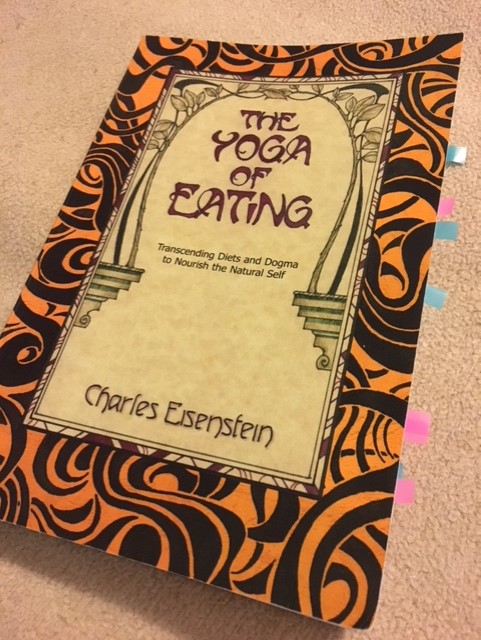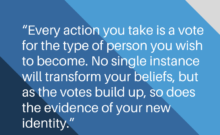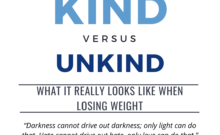If you follow my Instagram, you have likely seen one of my posts about The Yoga of Eating by Charles Eisenstein. This book is not thick, but it is particularly meaty. Even now, I think I should read it again to absorb its meaning more fully. You may know Charles Eisenstein by his recent and more well-known book, The More Beautiful World Our Hearts Know is Possible, which he chatted about recently with Oprah on Super Soul Sunday. If you are like me, once you see this thin, non-health-professional guy, you might think, “what does he know about eating and weight?” Well, it turns out, a good bit.
I am going to share a few excerpts from this book, and my thoughts about what he has written.
“But if body and soul are not separate, then to heal the body at the deepest level is a work of the soul, and to listen to and learn from the body is to become closer to one’s Self.”
As one who works and is educated in integrative health, I certainly appreciate and understand what we refer to as the mind/body/spirit connection, and agree with Eisenstein that it is much more than a connection, but a unified whole, not separate. And with this understanding, he says that if we really want to know and become our fullest, most true selves, we must listen and learn from our body. Our body communicates with our mind as well as our mind communicates with our body. He goes on to say that this oneness means that indeed eating is a spiritual experience. So, we must ask ourselves how we want to be in the world when considering how we eat.
“… because our conventional dietary recommendations are a confusing mishmash of shoulds and shouldn’ts that seemingly have little to do with our desires as expressed in the body, a diet of self-improvement inevitably becomes a diet of self-denial. But self-denial makes us crave nurturance all the more. When the experience of unconditional love and well-being has not been internalized, the soul seeks it externally – for example, from food. Food, an expression of Mother Nature’s unconditional love and generosity, makes us feel nurtured and cared for. Food is the most primitive reminder that the world is good, that the world will provide. … Remember that the need for nurturance is a genuine human need. To combat an unmet need with willpower is both foolish and futile. Only when we heal the wound of separation and accept and love ourselves without judgment does the need for external nurturance gradually wither away. One way this will manifest is in the diet. Without willpower, without denial or self-coercion, without the need for should and shouldn’ts, the relationship with food will change”
Ok, that was a big chunk. But, oh my gosh, so much truth here. What I take from this is that a lot of our experience of trying to diet turns into restriction, which is, in fact, the opposite of what we need. When we don’t give ourselves enough love or nurturing, we tend to seek it in food. This is natural – food is primal and does make us feel cared for. However, it is not a substitute for needs that food is not suited to fulfill. What a lot of people refer to in weight loss as having the right mindset, is often speaking to this concept – that you have to start lessening your shame and blame, and increasing your love and acceptance, and only then will you truly change your relationship with food. Instead of forcing, fighting, and will-powering ones way toward weight loss.
“A discrepancy between what we eat and who we are in the world generates a kind of tension, which is resolved either when the diet moves back in line with the person’s incarnate role, or when the person’s entire life changes to come into harmony with the new diet. Force, that is, willpower, can hold diet and being apart, but not forever. The tension will build, in the form of intense cravings, aversions, and eventually, physical illness. The body speaks it’s message louder and louder trying to get what it needs, even as it does its best to function with those needs unfulfilled.”
This resonates with me. If we are not being our true, authentic selves, our diet will be off. In order to correct our diet (and have our optimal health), we need to work on becoming our most true selves. And when we do, the diet will follow. Or, if we correct the diet, the only way to harmoniously continue that diet, will be to bring our lives into alignment with the diet. If we don’t, will we continue to be at odds with our body, making the whole process unsustainable. Does this resonate with you?
“When you chew food thoroughly for pleasure, you get a deeper, fuller experience of the flavors from a given portion, fulfilling your need for sensory nourishment. Naturally, then, you will need less food, and simpler food. Not because of self-denial, but rather because you are already delighted with simple fare.”
Here, Eisenstein is discussing the process of mindful eating, and how by doing this we actually enjoy our food more, and in turn, will automatically eat less. He argues that those that struggle with overeating are not actually overeating because they really enjoy food, but rather, because they don’t enjoy it enough. I do find this to be true. I have grown to really love the beauty and flavor of a mandarin orange, and am kind of amazed by them every time I eat one. When we slow down, pay attention to what we are eating and how we feel, we can be more in tune to eat well.
There are so many more nuggets of wisdom in this book, but I can’t cover them all here. Maybe I’ll return to this more in another post at a later date. But, I hope this has given you some interesting food for thought. If you are want to know more, Charles Eisenstein also offers an online course called Dietary Transformation from the Inside Out, and he has a very unique self-determining pay structure that I find kind of cool.




Leave a Comment